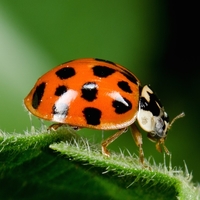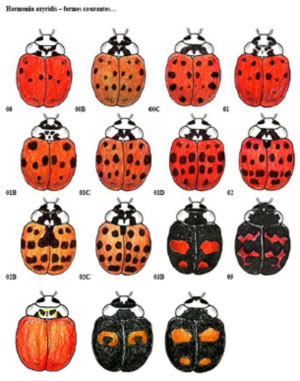Also known as multicolored Asian lady beetles or spotted lady beetles, lady bugs are named because they are beautiful, gentle, and elegantly dressed. However, that does not mean you want them invading your home! Learn more about them and Economy’s process for lady bug pest control here.
 How to Identify Lady Bugs
How to Identify Lady Bugs
Multicolored Asian lady beetle adults are small to moderate in size – about 7/32 to 1/4 of an inch long, oval, and can be red, yellow, orange, or black. North American populations range in color from yellow-orange to bright red-orange, with or without black spots. Their antennae are very short and usually not noticeable. The lady bug has an ivory pronotum (found just behind the head) with black markings that look like a W or M when viewed from the front or back.
The beetle has a chemical defense to discourage predators. This foul-smelling chemical is also present in their hemolymph (blood), and the beetles will “reflex bleed” when agitated, releasing hemolymph through the joints on their legs. This discharge will cause staining.
They are found throughout much of the eastern U.S., including our service areas of Charlotte, Raleigh, Chapel Hill, Durham, and Wilmington, NC.
Where do these Lady Bugs Come From?

Where do you See these Lady Bugs?
- Until recently, this insect was not even noticed inside homes and structures. Since their introduction into the U.S. in 1979, their spread has increased rapidly, with high populations developing quickly.
- Because of their overwintering behavior, the beetles congregate in homes and structures in and around siding, eaves, and attics, much like overwintering wasps.
- On occasional warm winter days, they can be observed in living quarters, where they are attracted to lights.
- NOTE: Although these beetles are considered beneficial, their hibernation habits make them more of a nuisance than a pest.
- Occasionally they will bite people as a way of obtaining salt. In addition, some people have exhibited an allergic reaction when they have come in contact with the hemolymph.
Ways to prevent lady bugs (lady beetles) from entering the home:
- Seal gaps around doors and windows
- Install chimney caps with screens
- Repair foundation cracks
- Seal siding cracks
- Repair foundation vent screens
- Seek professional assistance and a pest prevention plan
Economy’s Lady Bug Pest Control Program
Economy Exterminators’ Pest Control Solutions program uses the 3-step approach to solve your lady bug pest problem:
- Our 1st step is inspecting the property by a Raleigh, Charlotte, or Wilmington customer service representative. It is very important to know the species involved and the severity of the lady bug problem.
- The 2nd step is the initial treatment by a customer service representative of all areas the inspection revealed as critical. Economy Exterminators uses the newest and most effective materials to solve this pest problem fast for you. Critical areas typically include the living room, bedrooms, vaulted ceiling, and attics.
- The 3rd step is a 37-point inspection to identify areas that give lady bugs easy access to your property — cracks in the foundation, gaps in siding, and around windows and doors.
- Lady bugs are included in Economy’s 44 covered pests under Pest Control Solutions, our ongoing maintenance program.
Let us take care of your lady bug pest control needs. Reach out to Economy’s lady bug exterminators today.

 How to Identify Lady Bugs
How to Identify Lady Bugs


